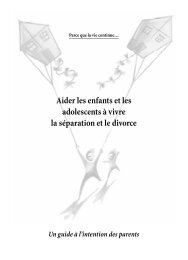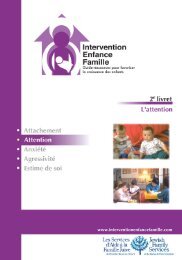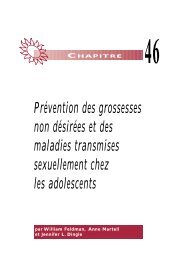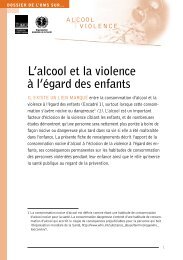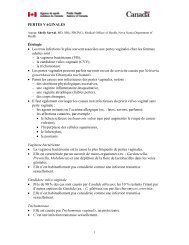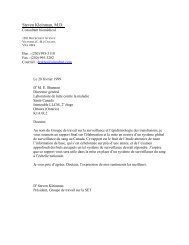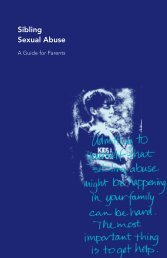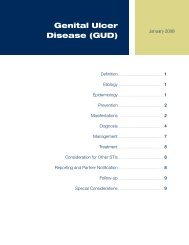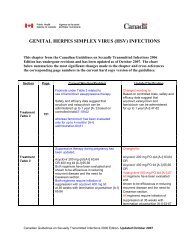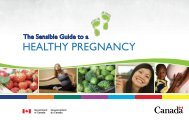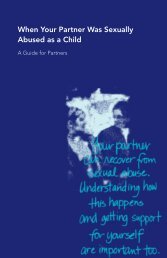When Children Act Out Sexually: A Guide for
When Children Act Out Sexually: A Guide for
When Children Act Out Sexually: A Guide for
Create successful ePaper yourself
Turn your PDF publications into a flip-book with our unique Google optimized e-Paper software.
<strong>When</strong> <strong>Children</strong><br />
<strong>Act</strong> <strong>Out</strong> <strong>Sexually</strong><br />
A <strong>Guide</strong> <strong>for</strong> Parents and Teachers
Sexual Abuse In<strong>for</strong>mation Series 2008<br />
This is one of ten booklets in the<br />
Sexual Abuse In<strong>for</strong>mation Series:<br />
SEXUAL ABUSE COUNSELLING<br />
A <strong>Guide</strong> <strong>for</strong> Parents and <strong>Children</strong><br />
SEXUAL ABUSE WHAT HAPPENS WHEN<br />
YOU TELL A <strong>Guide</strong> <strong>for</strong> <strong>Children</strong> and Parents<br />
WHEN GIRLS HAVE BEEN SEXUALLY ABUSED<br />
A <strong>Guide</strong> <strong>for</strong> Young Girls<br />
WHEN BOYS HAVE BEEN SEXUALLY ABUSED<br />
A <strong>Guide</strong> <strong>for</strong> Young Boys<br />
WHEN TEENAGE GIRLS HAVE BEEN<br />
SEXUALLY ABUSED A <strong>Guide</strong> <strong>for</strong> Teenagers<br />
WHEN TEENAGE BOYS HAVE BEEN<br />
SEXUALLY ABUSED A <strong>Guide</strong> <strong>for</strong> Teenagers<br />
WHEN MALES HAVE BEEN SEXUALLY ABUSED<br />
AS CHILDREN A <strong>Guide</strong> <strong>for</strong> Men<br />
WHEN CHILDREN ACT OUT SEXUALLY<br />
A <strong>Guide</strong> <strong>for</strong> Parents and Teachers<br />
SIBLING SEXUAL ABUSE A <strong>Guide</strong> <strong>for</strong> Parents<br />
WHEN YOUR PARTNER WAS SEXUALLY<br />
ABUSED AS A CHILD A <strong>Guide</strong> <strong>for</strong> Partners<br />
To order copies, please contact:<br />
www.phac-aspc.gc.ca/nc-cn<br />
National Clearinghouse on Family Violence<br />
Public Health Agency of Canada<br />
200 Eglantine Driveway<br />
Tunney’s Pasture, 1909D<br />
Ottawa, ON K1A 0K9<br />
TEL: 1.800.267.1291 or 613.957.2938<br />
FAX: 1.613.941.8930<br />
TTY: 1.800.561.5643 or 613.952.6396<br />
E-MAIL: ncfv-cnivf@phac-aspc.gc.ca<br />
CREDITS<br />
Project Coordinator: Leonard Terhoch<br />
Writer: John Napier-Hemy<br />
Revisions: Christina Melnechuk & Louise Doyle<br />
Editors : Joanne Broatch & Liz Scully<br />
Design & Layout: Jager Design Inc.<br />
Également disponible en français sous<br />
le titre : Les enfants sexuellement agressifs.<br />
<strong>Guide</strong> à l’intention des parents et des<br />
enseignants<br />
Special thanks to the staff at VISAC and the National Clearinghouse on Family Violence and the<br />
many others who gave their ideas and support.<br />
The opinions expressed in this document are those of the authors and do not necessarily reflect<br />
the views of the Public Health Agency of Canada.<br />
VISAC (Vancouver Incest and Sexual Abuse Centre) is a program of Family Services of Greater<br />
Vancouver. VISAC offers a wide range of services including specialized victim support services,<br />
individual and group therapy <strong>for</strong> children, youth, families, and adults who have experienced<br />
childhood sexual abuse and/or trauma.<br />
Contents may not be commercially reproduced but any other reproduction, with acknowledgements,<br />
is encouraged. All other rights are reserved.<br />
© 2008 Family Services of Greater Vancouver – 1616 West 7th Avenue, Vancouver, B.C. V6J 1S5<br />
THIS PUBLICATION WAS MADE POSSIBLE THROUGH THE FINANCIAL SUPPORT OF THE<br />
PUBLIC HEALTH AGENCY OF CANADA.<br />
HP20-6/7-2007 ISBN 978-0-9809135-3-8<br />
<strong>When</strong> <strong>Children</strong> <strong>Act</strong> <strong>Out</strong> <strong>Sexually</strong><br />
A <strong>Guide</strong> For Parents and Teachers<br />
This booklet answers these questions:<br />
Why is it hard to recognize the problem? 2<br />
What is normal sexual development? 3<br />
How is normal sexual development disrupted? 4<br />
Are there signs a child may have been abused? 5<br />
Why do abused children act out sexually? 5<br />
How should you respond to children who<br />
act out sexually with other children? 6<br />
Why is it important <strong>for</strong> adults to intervene<br />
when children act out sexually? 7<br />
How can we support a child who has<br />
acted out sexually? 8<br />
How can parents deal with their own feelings? 9<br />
What will your child’s counsellor do? 10<br />
Kids Help Phone 1.800.668.6868<br />
A <strong>Guide</strong> <strong>for</strong> Parents and Teachers 1
Why is it hard to recognize the problem?<br />
There are few problems as diffi cult <strong>for</strong> parents, teachers, and day-care<br />
staff as deciding how to deal with children in their care who are imposing<br />
sexual behaviour on other children. There are many questions to consider.<br />
Should you simply ignore the behaviour and hope the child will ‘grow out<br />
of it’? Or should you attempt to correct the behaviour, and run the risk of<br />
making the child feel guilty about normal sexual curiosity?<br />
How do you deal with your own discom<strong>for</strong>t in addressing the<br />
problem? Many adults in charge of young children come from homes<br />
where sex was never discussed. There is a substantial emphasis on<br />
sex in today’s society, so we may assume that our children are sexually<br />
sophisticated. We may risk viewing children’s<br />
sexual behaviour and language as a sign of<br />
the times and do nothing about it or we<br />
may envy their ‘openness’, and compare<br />
it unfavourably with our own ‘repressed’<br />
childhoods.<br />
<strong>Children</strong> today do have access to more<br />
in<strong>for</strong>mation about sex but it is also true that<br />
they are exposed to more misin<strong>for</strong>mation.<br />
They also experience a lot of sexual<br />
pressure from the media and from society as<br />
a whole. To help children in trouble, we must<br />
base our decisions on what we know as fact<br />
and not on what we imagine to be true.<br />
To know whether a child is being<br />
sexually aggressive or simply curious, we<br />
need to understand children’s normal sexual<br />
development. There is a world of difference, <strong>for</strong> example, between two<br />
children in a daycare pulling their pants down to look at one another’s<br />
genitals and a child <strong>for</strong>cing an object into another child’s anus.<br />
What is normal sexual development?<br />
Unless children are interfered with, their sexual development follows a<br />
natural sequence regardless of what society may think about sex at any<br />
given time. <strong>Children</strong> are born sexual. Boys are often born with erect penises<br />
and girls with lubricated vaginas. Masturbation is normal at all ages.<br />
Some of the following behaviour changes may take place at<br />
approximately the following ages:<br />
2-1/2 Years: <strong>Children</strong> begin to notice that boys and girls<br />
assume different postures to urinate. They may attempt to copy<br />
one another’s postures. They begin to show interest in physical<br />
differences.<br />
4 Years: <strong>Children</strong> may play games of ‘show’. They may use<br />
‘bathroom’ talk, and call one another names like ‘Poophead’. They<br />
are interested in their own genitals and those of others, they like to<br />
play nurse-doctor-patient games with peers and during play activities<br />
will look, touch and sometimes attempt to insert objects into body<br />
openings. They enjoy nudity and become aware of gender sex roles.<br />
<strong>When</strong> you take them to visit friends, they may show an interest in<br />
unfamiliar bathrooms. They may role-play activities they associate<br />
with Mommy and Daddy.<br />
5 Years: <strong>Children</strong> become more modest and will demand greater<br />
privacy.<br />
6 Years: <strong>Children</strong> begin to demand practical answers about the<br />
differences in the sexes. They may want to know where babies come<br />
from and how they are made. Parents should give children short<br />
concrete explanations which don’t tax their ability to listen.<br />
7 Years: There is generally less interest in sexual matters.<br />
8 Years: Experimentation becomes more hidden as children<br />
become more aware of social rules. Formal games diminish but<br />
children are still interested in exploration as it relates to stimulation.<br />
<strong>Children</strong> experiment with friends of the same sex because it is not<br />
as intimidating; mutual masturbation is not uncommon. Sex play<br />
also takes the <strong>for</strong>m of sex-related jokes, sexual rhymes, provocative<br />
giggling and whispering.<br />
2 WHEN CHILDREN ACT OUT SEXUALLY A <strong>Guide</strong> <strong>for</strong> Parents and Teachers 3
9 Years: <strong>Children</strong> begin to exchange sex in<strong>for</strong>mation with friends<br />
of the same sex. They may look in books <strong>for</strong> in<strong>for</strong>mation about<br />
their sexual organs and how they function.<br />
10 Years: Some girls and a few boys will have reached puberty by<br />
age 10. <strong>Children</strong> show greater interest in the opposite sex. There is<br />
considerable interest in sex-related jokes, which will be a little more<br />
sophisticated than the jokes they told when they were 8.<br />
Don’t be alarmed if children appear to skip some of these stages. All<br />
children are different and they all develop at different rates. The stages<br />
listed here are generally true, and are simply intended as a guideline to<br />
help you make an initial judgment about whether a specifi c child’s sexual<br />
behaviour is considered age-appropriate.<br />
How is normal sexual development disrupted?<br />
It can be disrupted by the unwanted and <strong>for</strong>ceful sexual attention of<br />
adults, older children or aggressive children their own age.<br />
Forceful sexual attention may take several <strong>for</strong>ms, such as:<br />
Continued exposure to pornographic video, magazines or<br />
images on the internet. Pornographic material is most harmful<br />
to children if they are <strong>for</strong>ced to watch it. However, it may also<br />
be harmful if it is left around the house in places where children<br />
can’t miss it.<br />
Sexual behaviour in front of children. If children are <strong>for</strong>ced to<br />
watch their baby-sitter having sex with a visiting friend, <strong>for</strong><br />
example, it can be a harmful experience. But parents shouldn’t<br />
worry if a child inadvertently walks in on their love-making.<br />
The difference is that the child is not <strong>for</strong>ced to watch, and the<br />
activity can be explained in a way that reassures the child.<br />
Disrespectful sexual attitudes and frequent use of sexual<br />
language and innuendo may encourage children to be <strong>for</strong>ceful<br />
and insensitive to others.<br />
Caregivers’ failure to respect privacy or body boundaries.This can<br />
cause children to grow up unaware that others need privacy and<br />
have boundaries.<br />
Sexual abuse. <strong>When</strong> children are sexually abused, they will most<br />
likely experience developmental disruption. This happens because<br />
sexual abuse <strong>for</strong>ces children to experience sexual activity when<br />
they are not physically or psychologically ready.<br />
Are there signs a child may have been abused?<br />
Yes. <strong>When</strong> children have been sexually abused or subjected to<br />
unwanted sexual attention, they may change their behaviour in<br />
a number of ways:<br />
They may exhibit behaviours such as night fears, fear of school<br />
changing rooms, depression, school failure and withdrawal from<br />
friends and activities.<br />
They may also exhibit aggressive behaviours such as fi ghting,<br />
being cruel to pets, setting fi res, and acting out sexually against<br />
other children.<br />
Why do abused children act out sexually?<br />
Although there is evidence that sexually abused children can act out<br />
against other children, the reason they do so isn’t always clear. People often<br />
assume that abused children would try to avoid repeating a frightening<br />
and distasteful activity. However, in many cases, children who have been<br />
sexually abused repeat the experience with other children in an ef<strong>for</strong>t to<br />
make sense of what happened to them and to regain a sense of control.<br />
For example, a boy may have been <strong>for</strong>ced to per<strong>for</strong>m oral sex on an<br />
older boy. The activity may have made him feel frightened, confused and<br />
sexually excited all at the same time. Repeating the activity with a younger<br />
child takes him out of the confused and helpless role and into a new and<br />
more powerful role. He is now less frightened and less anxious, and better<br />
understands why the older boy wanted oral sex per<strong>for</strong>med on him.<br />
4 WHEN CHILDREN ACT OUT SEXUALLY A <strong>Guide</strong> <strong>for</strong> Parents and Teachers 5
Boys are often ashamed to say they have been victims, so acting out<br />
sexually may be a way of calling out <strong>for</strong> help. Sometimes boys will admit<br />
that they have done something sexual to another child be<strong>for</strong>e they will<br />
disclose being victims themselves.<br />
Sexual acting out is only one of the ways in which children try to<br />
adapt to being abused. As a general rule, the more supported children<br />
feel after disclosing sexual abuse, the less likely they are to act out<br />
sexually. <strong>When</strong> we don’t allow children, boys in particular, to admit to<br />
feeling powerless or helpless, we often create situations in which the only<br />
feelings allowed are anger and aggression.<br />
The most important thing we can say to children is: “Talk about it – I<br />
want to know how you are feeling – I want to know what you are thinking<br />
and I want to help.”<br />
How should you respond to children who act out<br />
sexually with other children?<br />
<strong>Children</strong> who act out sexually should always be viewed with compassion.<br />
If their behaviour is upsetting to us, we may recoil and scapegoat them<br />
by calling them ‘offenders’ or ‘abusers’. These children need help just as<br />
much as their victims and you should explore ways to offer support and<br />
intervention. This may mean reporting them to the police and/or a child<br />
protection authority.<br />
Sometimes, when children are questioned, they will share that they<br />
themselves have been sexually abused by a teenager or an adult. Social<br />
service workers must protect children who act out sexually as well as<br />
their victims.<br />
If children who abuse other children are 12 years or older, they may<br />
be charged under the Youth Criminal Justice <strong>Act</strong>. The judge will take into<br />
account their age. Charging young offenders holds them accountable<br />
<strong>for</strong> their actions and may provide them with access to the specialized<br />
counselling they require. The judge will often rely on the experience and<br />
testimony of social workers, police and others to distinguish between<br />
children who have just started to abuse and older teenagers who have a<br />
more severe problem.<br />
Why is it important <strong>for</strong> adults to<br />
intervene when children act out<br />
sexually?<br />
<strong>Children</strong> who act out sexually and are not<br />
stopped hurt other children and themselves.<br />
Because they relate to other children in a<br />
sexual way, they are deprived of a chance<br />
to have real friendships. <strong>When</strong> children<br />
have a guilty secret, it is hard <strong>for</strong> them to<br />
be open with others and this affects their<br />
social relationships.<br />
A sense of power over others plus<br />
sexual excitement can be extremely rewarding,<br />
particularly since it compensates<br />
<strong>for</strong> poor self-esteem. The longer the sexual<br />
activities continue, the more diffi cult they<br />
are to stop.<br />
A child may abuse a child who then begins<br />
to abuse other children. There may then be a<br />
ripple effect, with the children initiating still<br />
more children into sexual activity. This may<br />
happen in a school or neighborhood and it is<br />
another reason <strong>for</strong> adults to intervene when<br />
children act out sexually.<br />
6 WHEN CHILDREN ACT OUT SEXUALLY A <strong>Guide</strong> <strong>for</strong> Parents and Teachers 7
Sexual abuse of any kind thrives on secrecy; breaking secrecy is the<br />
fi rst step towards helping everyone involved. <strong>Children</strong> who abuse must<br />
be interviewed by social services or police <strong>for</strong> two reasons: to help them<br />
admit to what they have done, and to provide insights as to why they<br />
are doing it. Once they admit to abusing, they are much less likely to<br />
continue. As long as they deny what they are doing, and deny their own<br />
probable victimization, they are much more likely to continue acting out<br />
in this way.<br />
How can we support a child who has acted out sexually?<br />
As a parent, you can help in several different ways:<br />
Don’t overreact and don’t underreact, try to get all the facts<br />
about what happened and provide support to your child.<br />
Your child may need to be closely supervised and not be left<br />
alone with other children until he or she has learned to control<br />
her/his behaviour.<br />
You must maintain affection and support <strong>for</strong> your child. The<br />
sexually acting-out child already has low self-esteem, and is<br />
going through a crisis. The child needs plenty of love and<br />
attention.<br />
If the social workers or police recommend counselling <strong>for</strong> the<br />
child, it is important <strong>for</strong> you to comply. Parents sometimes<br />
believe that if they simply scold the child or withdraw privileges,<br />
the problem will be solved. They often mistakenly believe that a<br />
problem will go away of its own accord if it isn’t discussed.<br />
You can work with your child’s counsellor as much as possible to<br />
help your child change her/his behaviour.<br />
Schools can help by using sexual abuse prevention programs.<br />
School programs have already encouraged many children to disclose<br />
incidents of sexual abuse. Teachers presenting these programs<br />
should point out that it isn’t just strangers in cars who sexually<br />
abuse children. It may be family members and it may even be other<br />
children.<br />
Police can help by warning children of the consequences of their<br />
activities if they are carried into adolescence or adulthood.<br />
Counsellors can help children understand the causes of their<br />
behaviour, and learn how to control it. It is important that the<br />
offending behaviour be addressed and<br />
controlled be<strong>for</strong>e dealing with previous<br />
victimization that may have occurred.<br />
How can parents deal with their<br />
own feelings?<br />
Finding out that your own child has sexually<br />
abused another child may be one of the<br />
most diffi cult life experiences you’ll ever<br />
have to face. Most parents go into shock<br />
initially, then through a period of denial<br />
where they try to pretend that nothing has<br />
happened. For a while they might feel as<br />
though they’re on a roller-coaster ride of<br />
unfamiliar and confl icting emotions.<br />
Here are some common reactions:<br />
There’s been a mistake.<br />
My child would never have done<br />
such a thing.<br />
It’s not our fault.<br />
There’s too much talk about<br />
sex these days. Look at the TV<br />
programming. It’s a wonder they<br />
don’t all grow up to be perverts.<br />
I’m so ashamed.<br />
Where did we go wrong?<br />
8 WHEN CHILDREN ACT OUT SEXUALLY A <strong>Guide</strong> <strong>for</strong> Parents and Teachers 9
What will they do to her/him?<br />
Will s/he be taken away . . . have to go to jail . . . or a<br />
foster-home?<br />
We don’t need any help. We’ve always handled our own<br />
problems as a family. If we can all pull together, we can put<br />
this behind us in no time.<br />
I feel so helpless. Everyone else is ‘calling the shots’ now.<br />
If you’re a parent whose child has abused another child, it’s normal to<br />
go through all of these reactions, often within a short span of time. Your<br />
child’s counsellor or a counsellor of your own can help. The crisis may<br />
also trigger memories of sexual abuse incidents from your own childhood<br />
which perhaps you’ve tried to <strong>for</strong>get.<br />
What will your child’s counsellor do?<br />
Usually your child’s counsellor will have specialized training in child sexual<br />
abuse with a good knowledge of both victim and abuser treatment.<br />
The counsellor will help you and your child do three important<br />
things:<br />
Learn strategies to deal with the molesting behaviour;<br />
Learn strategies to manage the feelings that led to the<br />
acting out behaviour; and<br />
Develop healthy sexual attitudes and social<br />
relationships.<br />
With your help, the crisis can become an opportunity <strong>for</strong> change and<br />
growth.<br />
<strong>Children</strong> develop sexually at their own rate and in<br />
their own way provided their development is not<br />
disrupted. Both parents and teachers have a critical<br />
role to play in identifying and helping children who<br />
are sexually abusing other children. Your worst fear<br />
may be that the child will grow up to be an adult<br />
sexual offender. It doesn’t have to turn out that<br />
way. The more that counsellors can help children to<br />
manage their behaviour and express their feelings,<br />
the more likely they are to stop.<br />
For in<strong>for</strong>mation on internet safety go to<br />
www.CyberTip.ca and www.safecanada.ca<br />
Additional resources are available at your<br />
community resource centre, your local library or<br />
the National Clearinghouse on Family Violence.<br />
10 WHEN CHILDREN ACT OUT SEXUALLY A <strong>Guide</strong> <strong>for</strong> Parents and Teachers 11



